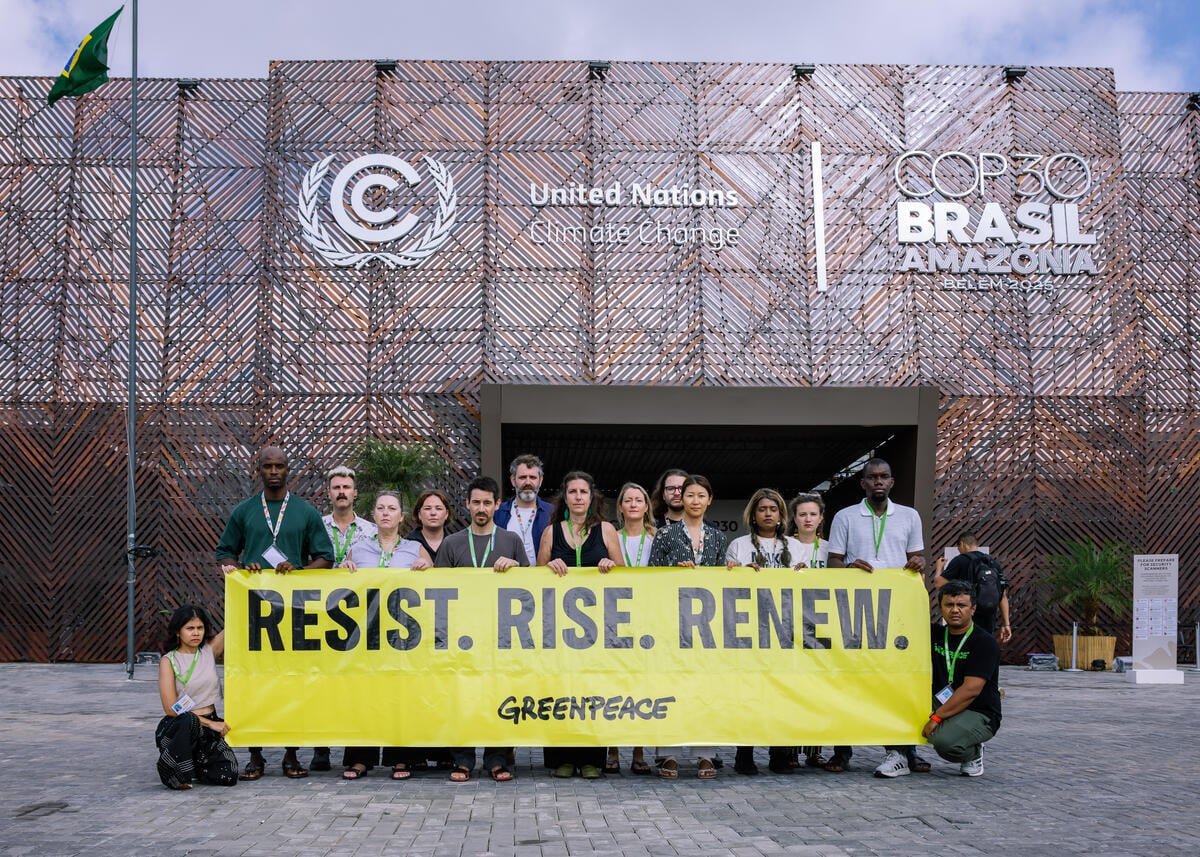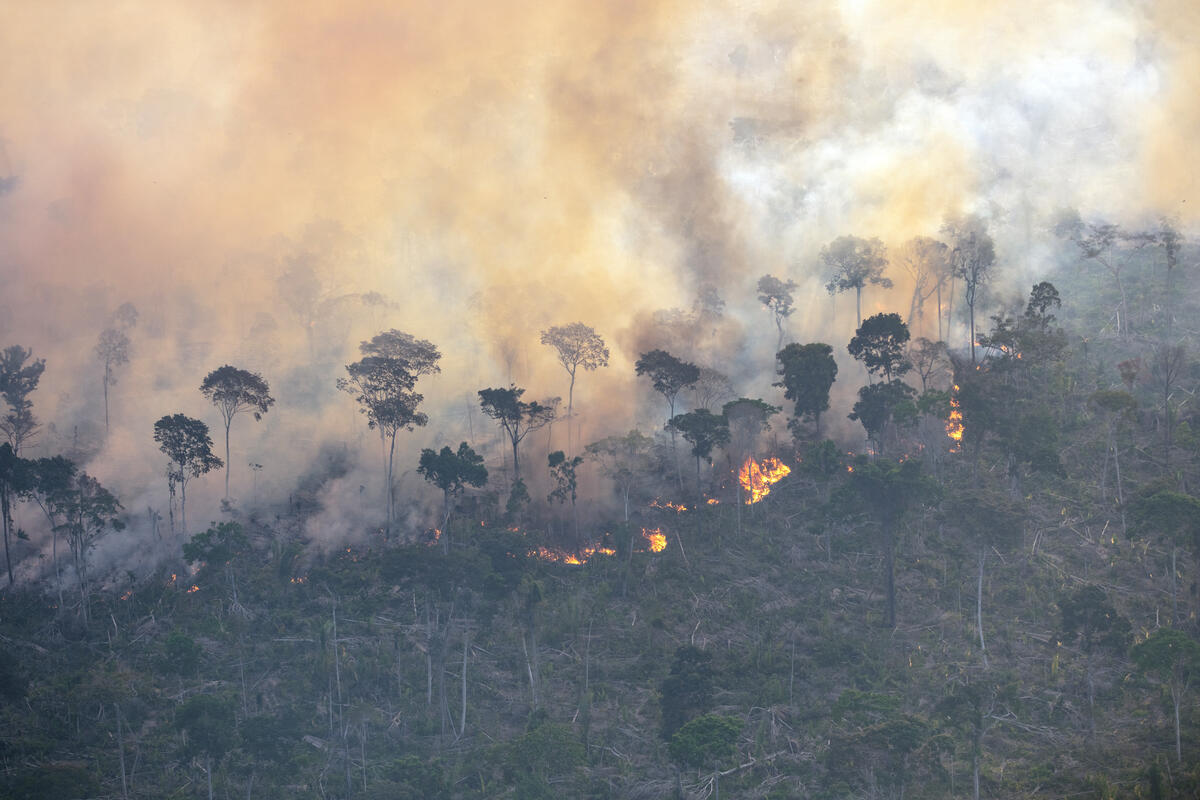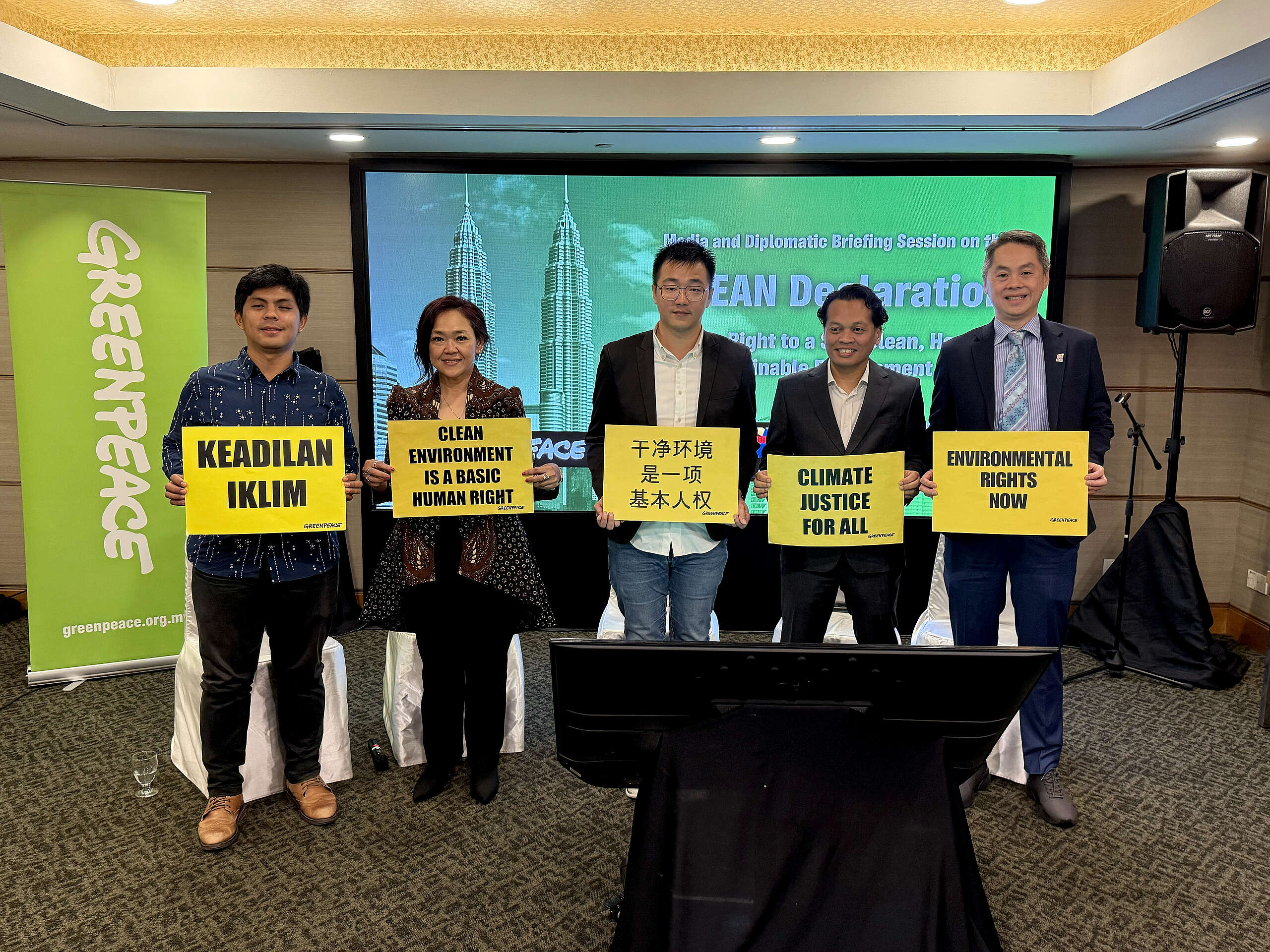Greenpeace Malaysia stands in solidarity with Orang Asli in Kelantan to champion for climate action through stronger forest governance.
Nenggiri, Kelantan, 5 Aug 2024 – Greenpeace Malaysia stands in solidarity with Kelantan orang asli to highlight areas within the state that are facing unchecked environmental degradation caused by massive deforestation that have deprived of their basic human rights and basic needs such as clean water. While at the same time to draw political candidates focus for the upcoming Nenggiri by-election to prioritise the resulting critical climate change impacts and the need for stronger forest governance to address these issues.
The severity of issues faced by Kelantan’s people have deep, lasting consequences on the state’s people, from their livelihoods to their lives. This rings even truer for the most vulnerable and often forgotten orang asli communities. Despite its far reaching effects, there is a disparity between what has been discussed about Kelantan in parliament and by elected representatives.
An overarching concern raised stems from unsustainable logging practices and encroachment into forests, which consequently have impacts on the worsening climate change, such as flooding, heatwaves and droughts. These impacts affect the state’s populace in varying ways from food, water and energy security issues, to the displacement of orang asli communities from their homes, and the disruption of wildlife habitats.
AnnJil Chong, Clean Environment Campaigner for Greenpeace Malaysia:
“Just as a forest needs strong ecosystems to flourish, successful governance requires robust systems to thrive. It is imperative that we elect competent political representatives who are capable of implementing established climate change solutions with a focus on the preservation of natural resources and environmental protection. These representatives should be tasked with enacting robust legislation pertaining to forest governance, thereby ensuring the long-term sustainability and prosperity of Kelantan.”
1. CLIMATE CHANGE
According to Global Forest Watch, the state has lost approximately 179,000 hectares (179kha) of primary forest between 2002 and 2023 – that roughly translates to 250,000 FIFA football fields worth of forests in Kelantan alone in a decade. The loss in forests through uncontrolled deforestation and unsustainable or illegal logging contributes to more frequent, severe and intense flooding in the state, in addition to increasing soil erosion issues as a result of the reduction in trees capacity to retain water.
Despite the severity of the issue, the Kelantan state government announced last year of plans to declassify environmentally sensitive areas (ESAs), such as the Gua Musang enclave, a move which would affect Kelantan National Park and the Federal Government’s promise to achieve 50% forested area in Peninsular Malaysia.
Additionally, throughout Greenpeace Malaysia’s Hansard scraping analysis of 2023, there were 506 questions raised relating to Kelantan over the 3 seatings, with only 1 mention at parliament of illegal logging and 1 on Environmental Impact Assessment (EIA), despite 27 mentions of flood and 12 mentions of flood mitigation.
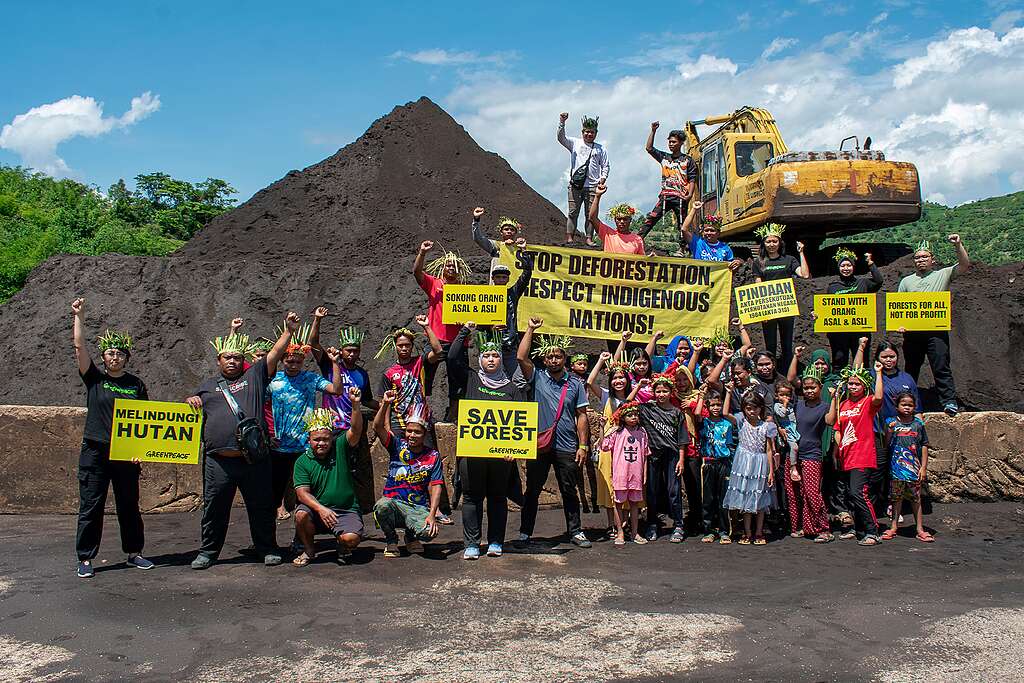
2. LAND ENCROACHMENT ISSUES.
The encroachment into forested land involves the disregard of orang asli communities rights to their ancestral land, cultural practices and way of living. As destructive logging practices such as clear cutting of forests for developmental projects, mining and monoculture farming continue, Kelantan’s ecological balance degrades with it. From the pollution of water sources such as rivers; to the endangerment and loss of lives, crop damage and property destruction with the increase in human-wildlife conflicts.
The Kelantan Forestry Department recorded 137 cases of encroachment in the state’s forests between 2020 and 2023, 98 of which were reported to be resolved. However, in Greenpeace Malaysia’s scraping of the 2023 parliamentary Hansard, there was only 1 mention of encroachment and 1 mention of indigenous peoples rights relating to Kelantan
3. FOOD, WATER and ENERGY SECURITY
Land encroachment issues and deforestation are but one of the sources of water pollution and crop damage. Rapid weather pattern changes from the resulting ecological imbalance have also influenced the severity and frequency of impacts from flooding and droughts – in effect, doubling the food and water security crisis.
Increasing and unexpected changes in weather conditions are affecting the rice bowl of the Kelantan people as a dry spell in Kelantan negatively impacted paddy fields output, causing an estimated loss of RM58 million.
While Kelantan grapples with the lowest treated water supply coverage nationally at 73.9%, the pollution of orang asli water sources, resulting from man-made interference in natural forests continues to escalate. This includes the systematic disregard of indigenous livelihood as the Kelantan government bulldozes through for environmentally unsound projects such as several mining and monoculture farming projects affecting Kampung Kelaik orang asli. As well as the Nenggiri dam affecting Gua Musang orang asli in the name of addressing flooding issues and generating energy despite proven solutions that require the protection of natural forests and more environmentally sustainable renewable energy such as solar power.
In the 2023 parliamentary Hansard scraping, topics of concern relating to water security in Kelantan showed only 2 mentions of water crisis, 4 on water supply in addition to only 2 mentions of river pollution and 2 river conservation. While energy security remains highly focused on dams with 3 mentions and only 1 mention on solar energy resources.
Among the areas highlighted by Greenpeace Malaysia and Kelantan orang asli community were:
- Muse Ecopark for its unique karst landforms which are closely tied to the hydrological cycle.
- The Kuala Betis Forest Inspection Centre serves as a regulatory facility responsible for monitoring and evaluating the ongoing logging operations in the adjacent regions. This institution plays a crucial role in ensuring compliance with established forestry regulations and sustainable practices within the designated areas under its jurisdiction.
- The river pollution (Kelaik and Rumlang river) and environmental wrecking practices at Kampung Kelaik.
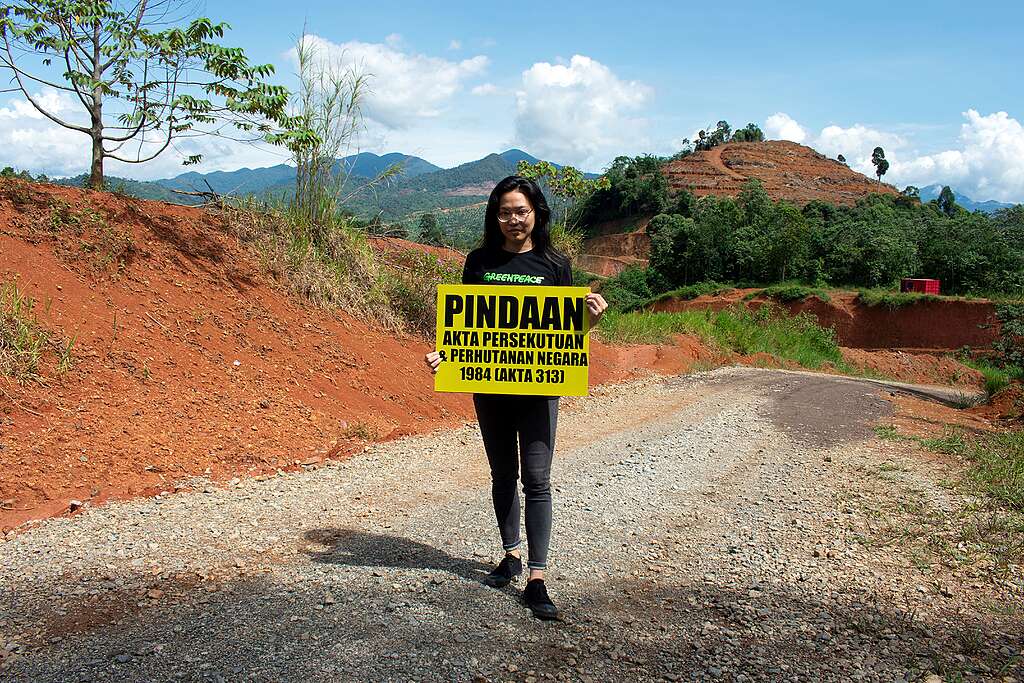
CALL TO ACTION
- Nenggiri by-election candidates must prioritise the issue of forest governance in Kelantan with a stronger call nationally, for effective forestry legislation that includes the enforcement of strict regulations to prevent illegal and unchecked logging and deforestation.
- The acknowledgement and enhanced support of orang asli rights to their ancestral land and livelihood.
- Investing in renewable energy sources, particularly solar power, to reduce reliance on unsustainable energy.

